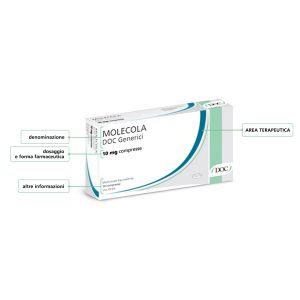Ship in Europe, Find out rates!
Doc Generici Ibuprofen 400mg 10 Coated Tablets

- box Delivery in Italy in 24/48 and free returns
- star3.000+ positive reviews
- dropboxOver 60,000 products in the catalog
Ibuprofen DOC contains ibuprofen, which belongs to a class of medicines called NSAIDs (non-steroidal anti-inflammatory drugs). These medicines work by reducing pain and swelling caused by inflammation
Therapeutic indications
Ibuprofen DOC is used:
- as an antirheumatic in:
- osteoarthritis in all its localizations (cervical, dorsal, lumbar arthrosis; arthrosis of the shoulder, hip, knee, diffuse osteoarthritis, etc.), scapulo-humeral periarthritis, lumbago, sciatica, radiculo-neuritis; fibrositis, tenosynovitis, myositis, sports traumatology; rheumatoid arthritis, Still's disease
- as an analgesic in painful forms of different etiology:
- in accidental and sports traumatology;
- in dental practice, in post-extraction pain and after odontostomatological interventions;
- in obstetrics: in post-episiotomic and post-partum pain;
- in gynecology: in the prevention and treatment of dysmenorrhea;
- in surgery: in the treatment of post-operative pain;
- in ophthalmology: in post-operative pain and painful forms of various etiology;
- in general medicine: in the treatment of migraine and headache.
Dosage and Posology
Take according to the following doses in adults and adolescents ≥ 40 kg (aged 12 years and over): 2 - 4 tablets per day at the doctor's discretion.
The maximum daily dose should not exceed 1800 mg. In rheumatology, to improve morning stiffness, the first oral dose is given when the patient wakes up; subsequent doses can be taken with meals. In the presence of renal insufficiency, elimination can be reduced and the dosage should be adjusted accordingly
appropriate.
Undesirable effects can be minimized by using the lowest effective dose for the shortest possible duration of treatment needed to control symptoms If use of the medicine is needed for more than 3 days in adolescents, or if symptoms, the doctor should be consulted. If the use of the medicinal product is required for more than 4 days in adults, the doctor should be consulted.
Pediatric population: Not recommended in adolescents weighing less than 40 kg or in children under 12 years of age.
How to use
The film-coated tablets should be swallowed whole with water. In patients with gastric sensitivity it is recommended to take ibuprofen with meals.
Overdose
In adolescents and adults the dose response effect is not clearly defined in overdose. The half-life in overdose is 1.5-3 hours.
Signs and symptoms of toxicity were generally not observed at doses below 100 mg / kg in children or adults. However, supportive treatment may be required in some cases. Children have been observed to exhibit signs and symptoms of toxicity after ingestion of ibuprofen at doses of 400 mg / kg or greater. Symptoms Most patients who have ingested significant amounts of ibuprofen will experience symptoms within 4-6 hours. The most commonly reported symptoms of overdose include: nausea, vomiting, abdominal pain, lethargy and somnolence and very rarely diarrhea. Gastrointestinal bleeding is also possible. Effects on the central nervous system (CNS) include headache, tinnitus, dizziness, seizures and loss of consciousness. In the case of more severe poisoning, toxicity is observed in the central nervous system, manifesting as drowsiness, and occasionally arousal and disorientation or coma. Occasionally patients develop seizures. Nystagmus, metabolic acidosis, hypothermia, renal effects, gastrointestinal bleeding, coma, apnea, diarrhea, and CNS and respiratory depression have also been reported rarely. Disorientation, arousal state, fainting and cardiovascular toxicity including hypotension, bradycardia and tachycardia have been reported. In cases of significant overdose, renal failure and liver damage are possible. Metabolic acidosis may occur in severe poisoning and the prothrombin time / INR may be prolonged, possibly due to interference with the actions of circulatory clotting factors. Exacerbation of asthma is possible in asthmatic patients.
There is no specific antidote to ibuprofen overdose. In the event of overdose, symptomatic and supportive treatment is therefore indicated, including maintenance of a patent airway. Particular attention is due to the control of blood pressure, vital signs, acid-base balance and any gastrointestinal bleeding. Administration of activated charcoal should be considered within one hour of ingesting a potentially toxic amount. Alternatively, gastric lavage should be considered within one hour of ingesting a potentially life-threatening overdose in adults. Adequate diuresis should be ensured and renal and hepatic functions should be closely monitored. The patient should remain under observation for at least four hours following ingestion of a potentially toxic amount of drug. Any occurrence of frequent or prolonged seizures should be treated with intravenous diazepam or lorazepam. Depending on the clinical condition of the patient, other supportive measures may be necessary. Administer bronchodilators for asthma. For more information, contact your local poison control center.
Contraindications
- Hypersensitivity to the active substance or to any of the excipients
- Subjects with hypersensitivity to acetylsalicylic acid or to other analgesics, antipyretics, non-steroidal anti-inflammatory drugs (NSAIDs), particularly when hypersensitivity is associated with nasal polyposis, angioedema and / or asthma
- Severe hepatic insufficiency
- Severe renal insufficiency (glomerular filtration less than 30ml / min)
- Severe heart failure (NYHA class IV)
- Severe or active peptic ulcer
- History of gastrointestinal bleeding or perforation related to previous active treatments or history of recurrent peptic ulcer / haemorrhage (two or more distinct episodes of proven ulceration or bleeding)
- Ibuprofen should not be given to patients with clinical conditions that lead to an increased bleeding tendency
- Ibuprofen is contraindicated during the third trimester of pregnancy
- Severe dehydration (caused by vomiting, diarrhea or insufficient fluid intake)
- Children with a body weight of less than 40 kg or in children under 12 years of age.
Side effects
The side effects seen with ibuprofen are generally common to other analgesics, antipyretics, non-steroidal anti-inflammatory drugs.
- Gastrointestinal disorders: the most commonly observed adverse events are gastrointestinal in nature. Peptic ulcers, gastrointestinal perforation or bleeding, sometimes fatal, may occur, particularly in the elderly. Gastrointestinal perforation with the use of ibuprofen has been rarely observed. Nausea, vomiting, diarrhea, flatulence, constipation, dyspepsia, epigastric pain, heartburn, abdominal pain, melaena, haematemesis, ulcerative stomatitis, exacerbation of colitis and Crohn's disease have been reported following administration of ibuprofen DOC. Gastritis was observed less frequently. Esophagitic pancreatitis and intestinal narrowing have also been observed very rarely. The patient should be instructed to discontinue the medicinal product and to see the physician immediately if severe upper abdominal pain or melaena or haematemesis occurs.
- Immune system disorders: Hypersensitivity reactions have been reported following treatment with NSAIDs. These may consist of a) non-specific allergic reaction and anaphylaxis, b) respiratory tract reactions including asthma, even severe, bronchospasm or dyspnoea or c) various skin disorders, including various types of rash, itching, urticaria, purpura, angioedema and, more rarely, exfoliative and bullous dermatitis (including Stevens-Johnson syndrome, toxic epidermal necrolysis and erythema multiforme). Very rarely: Severe general hypersensitivity reactions. Symptoms could be: swelling of the face, tongue and larynx, dyspnoea, tachycardia, hypotension (angioedema or severe shock). If any of these symptoms occur, which can happen even on first use, immediate medical attention is required.
- Cardiac and vascular disorders: edema, fatigue, hypertension and heart failure, vasculitis have been reported in association with NSAID treatment. Clinical studies suggest that the use of ibuprofen, especially at high doses (2400 mg / day), may be associated with a modest increased risk of arterial thrombotic events (e.g. myocardial infarction or stroke)
- Blood and lymphatic system disorders: leukopenia, thrombocytopenia, neutropenia, agranulocytosis, aplastic anemia and haemolytic anemia. The first signs are: fever, sore throat, superficial mouth ulcers, flu-like symptoms, severe exhaustion, bleeding and unexplained bruising. In these cases the patient should be advised to discontinue the medicinal product immediately, to avoid any self-medication containing analgesics or antipyretics and to consult the doctor. In long-term therapy, blood counts should be performed regularly. Very rarely: pancytopenia
- Psychiatric disorders: insomnia, anxiety, depression, confusion, hallucinations, psychotic reactions
- Nervous system disorders: headache, paraesthesia, dizziness, somnolence, optic neuritis, insomnia, agitation, irritability or fatigue.
- Infections and infestations: Aseptic rhinitis and meningitis (especially in patients with pre-existing autoimmune disorders, such as systemic lupus erythematosus and mixed connective tissue disease) with symptoms of neck stiffness, headache, nausea, vomiting, fever or disorientation If signs of an infection occur or this worsens during the use of Ibuprofen DOC, the patient is recommended to go to the doctor without delay. Tests should be done to see if this is an indication for anti-infectious / antibiotic therapy.
- Respiratory system disorders: bronchospasm, dyspnoea, apnea, asthma.
- Eye disorders: rare cases of ocular alteration with consequent visual disturbances, toxic optic neuropathy
- Ear and labyrinth disorders: impaired hearing, tinnitus, vertigo.
- Hepatobiliary disorders: impaired liver function, liver failure, hepatitis and jaundice, liver damage, liver injury
- Skin and subcutaneous tissue disorders: skin eruptions (Rash), pruritus, purpura, angioedema bullous reactions, including Stevens-Johnson syndrome and toxic epidermal necrolysis (very rare), erythema multiforme, photosensitivity reactions and alopecia. In exceptional cases, severe skin infections and soft tissue complications can occur during a chickenpox infection (see also “Infections and Infestations”).
- Renal and urinary disorders: impairment of renal function and toxic nephropathy in various forms, including interstitial nephritis, nephrotic syndrome and renal failure. Renal tissue damage (papillary necrosis) and elevated blood uric acid concentrations may also occur rarely. . Renal function should therefore be monitored regularly.
- General disorders and administration site conditions: malaise, fatigue and edema.
Pregnancy and breastfeeding
Inhibition of prostaglandin synthesis can adversely affect pregnancy and / or embryo / fetal development. Results of epidemiological studies suggest an increased risk of miscarriage and cardiac malformation and gastroschisis after use of a prostaglandin synthesis inhibitor in early pregnancy. The absolute risk of cardiac malformations increased from less than 1% to approximately 1.5%. The risk is believed to increase with dose and duration of therapy. In animals, administration of prostaglandin synthesis inhibitors has been shown to cause increased pre- and post-implantation loss and embryo-fetal mortality. Furthermore, an increased incidence of various malformations, including cardiovascular, has been reported in animals given prostaglandin synthesis inhibitors during the organogenetic period. During the first and second trimester of pregnancy, Ibuprofen DOC should not be administered except in strictly necessary cases. If Ibuprofen DOC is used by a woman attempting to conceive or during the first and second trimester of pregnancy, the dose and duration of treatment should be kept as low as possible.
During the third trimester of pregnancy, all prostaglandin synthesis inhibitors can expose the fetus to: - Cardiopulmonary toxicity (with premature closure of the arterial duct and pulmonary hypertension); -Renal dysfunction, which can progress to renal failure with oligo-hydroamnios; the mother and the newborn, at the end of pregnancy, to: - Possible prolongation of the bleeding time, and antiplatelet effect which can occur even at very low doses; -Inhibition of uterine contractions resulting in delayed or prolonged labor. Consequently Ibuprofen DOC is contraindicated during the third trimester of pregnancy.
In the few studies available to date, NSAIDs can be found in breast milk in very low concentrations. If possible, NSAIDs should be avoided during breastfeeding.
The use of Ibuprofen may impair female fertility through effects on ovulation and is not recommended in women attempting to conceive.In women who have difficulty conceiving or who are being investigated for infertility, treatment discontinuation should be considered with ibuprofen.
Special warnings
Caution is needed in patients with certain conditions, which may worsen:
- congenital disorders of porphyrin metabolism (eg acute intermittent porphyria);
- Systemic lupus erythematosus and mixed connective tissue disease - increased risk of aseptic meningitis
- directly after major surgery
- in patients who react allergically to other substances, as there is an increased risk of hypersensitivity reactions for them even with the use of Ibuprofen DOC;
- in patients suffering from hay fever, nasal polyps or chronic obstructive respiratory disease as there is an increased risk of allergic reactions for them. These can manifest as asthma attacks (so-called analgesic asthma), Quincke's edema or urticaria.
The concomitant use of Ibuprofen DOC with other NSAIDs, including selective cyclooxygenase-2 (COX-2) inhibitors, should be avoided due to an increased risk of ulceration or bleeding. Undesirable effects can be minimized by using the lowest effective dose for the shortest possible duration of treatment needed to control symptoms. Like other NSAIDs, ibuprofen can mask signs of infection
Expiry and Retention
This medicine does not require any special storage conditions.
Warning: do not use Ibuprofen DOC after the expiry date shown on the package
Composition
One tablet of Ibuprofen DOC contains:
Active principle
400 mg of ibuprofen
Excipients
Tablet core: maize starch, pregelatinised starch, microcrystalline cellulose, colloidal anhydrous silica, magnesium stearate
Tablet coating: cellulose derivative / polyoxyl 40 stearate, hypromellose, titanium dioxide, propylene glycol, macrogol 8000
| Destination | Cost | Detail |
|---|---|---|
| Italy | €5,90* | 24/72H |
| Austria, France, Germany, Slovenia | € 13* | 3 days |
| Belgium, Luxembourg, Portugal, Netherlands, Spain | € 14* | 4 days |
| Bulgary, Cechia, Hungary, Poland, Romania, Slovakia | € 19* | 5 days |
| Denmark, Estonia, Finland, Ireland, Lithuania, Latvia ,Sweden | € 22* | 5 days |
| United Kingdom, Switzerland, Greece, Malta/td> | € 30* | 7 days |
| Canada | € 40 | 7 Days |
European shipments with express courier: FedEx, MBE, DHL
*For the shipment outside band B ther's an extra cost of 22€ *For the shipment outside band C ther's an extra cost of 30€ Delivery Times exclude Saturday and Holidays
For Islands and Areas of difficult Accessibility the shipments are made in 72 hours and the cost will be increased by 15€

